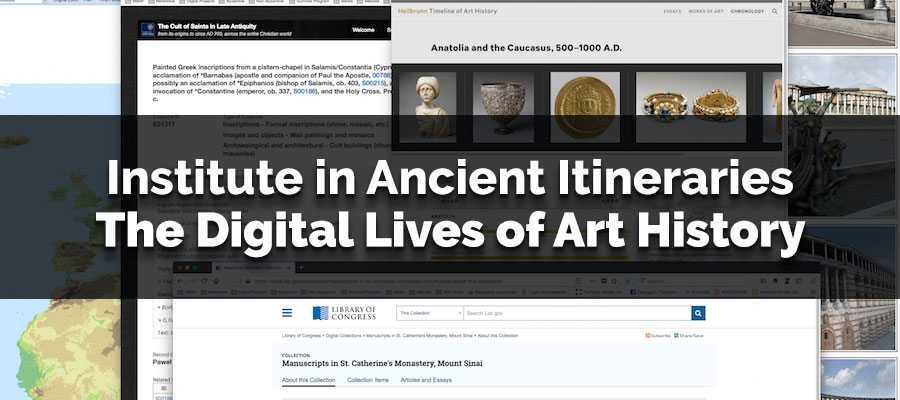The 18-month Institute in Digital Art History is led by King’s College London’s Department of Digital Humanities (DDH) and Department of Classics, in collaboration with HumLab at the University of Umeå, with grant support provided by the Getty Foundation as part of its Digital Art History initiative.
It will convene two international meetings where Members of the Institute will survey, analyse and debate the current state of digital art history, and map out its future research agenda. It will also design and develop a Proof of Concept (PoC) to help deliver this agenda. The source code for this PoC will be made available online, and will form the basis for further discussions, development of research questions and project proposals after the end of the programme.
To achieve these aims we will bring together leading experts in the field to offer a multi-vocal and interdisciplinary perspective on three areas of pressing concern to digital art history:
- Provenance, the meta-information about ancient art objects,
- Geographies, the paths those objects take through time and space, and
- Visualization, the methods used to render art objects and collections in visual media.
Current Digital Humanities (DH) research in this area has a strong focus on Linked Open Data (LOD), and so we will begin our exploration with a focus on LOD. This geographical emphasis on the art of the ancient Mediterranean world will be continued in the second meeting to be held in Athens. The Mediterranean has received much attention from both the Digital Classics and DH communities, and is thus rich in resources and content. The programme will, therefore, bring together two existing scholarly fields and seek to improve and facilitate dialogue between them.
We will assign Members to groups according to the three areas of focus above. These groups will be tasked with producing a detailed research specification, detailing the most important next steps for that part of the field, how current methods can best be employed to make them, and what new research questions the participants see emerging.
The meetings will follow a similar format, with initial participant presentations and introductions followed by collaborative programme development and design activities within the research groups, including scoping of relevant aspects of the PoC. This will be followed by further discussion and collaborative writing which will form the basis of the event’s report. Each day will conclude with a plenary feedback session, where participants will share and discuss short reports on their activities. All of the sessions will be filmed for archival and note-taking purposes, and professional facilitators will assist in the process at various points.
The scholarly outputs, along with the research specifications for the PoC, will provide tangible foci for a robust, vibrant and sustainable research network, comprising the Institute participants as a core, but extending across the emerging international and interdisciplinary landscape of digital art history. At the same time, the programme will provide participants with support and space for developing their own personal academic agendas and profiles. In particular, Members will be encouraged to and offered collegial support in developing publications, both single- and co-authored following their own research interests and those related to the Institute.
The core team comprises of Dr Stuart Dunn (DDH), Professor Graeme Earl (DDH) and Dr Will Wootton (Classics) at King’s College London, and Dr Anna Foka of HumLab, Umeå University.
Call for Participation
The team is pleased to invite applications to participate as Members in the programme. Applications are invited from art historians and professional curators who (or whose institutions) have a proven and established record in using digital methods, have already committed resources, or have a firm interest in developing their research agendas in art history, archaeology, museum studies, and LOD. Applicants should also be prepared to contribute to the design of the PoC (e.g. providing data or tools, defining requirements), which will be developed in the timeframe of the project by experts at King’s Digital Lab.
Membership is open to advanced doctoral students (provided they can demonstrate close alignment of their thesis with the aims of the programme), Faculty members at any level in all relevant fields, and GLAM curation professionals.
Participation will primarily take the form of attending the Institute’s two meetings:
- King’s College London: 3rd-14th September 2018
- Swedish Institute at Athens: 1st-12th April 2019
We anticipate offering up to eighteen places on the programme. All travel and accommodation expenses to London and Athens will be covered. Membership is dependent upon commitment to attend both events for the full duration.
